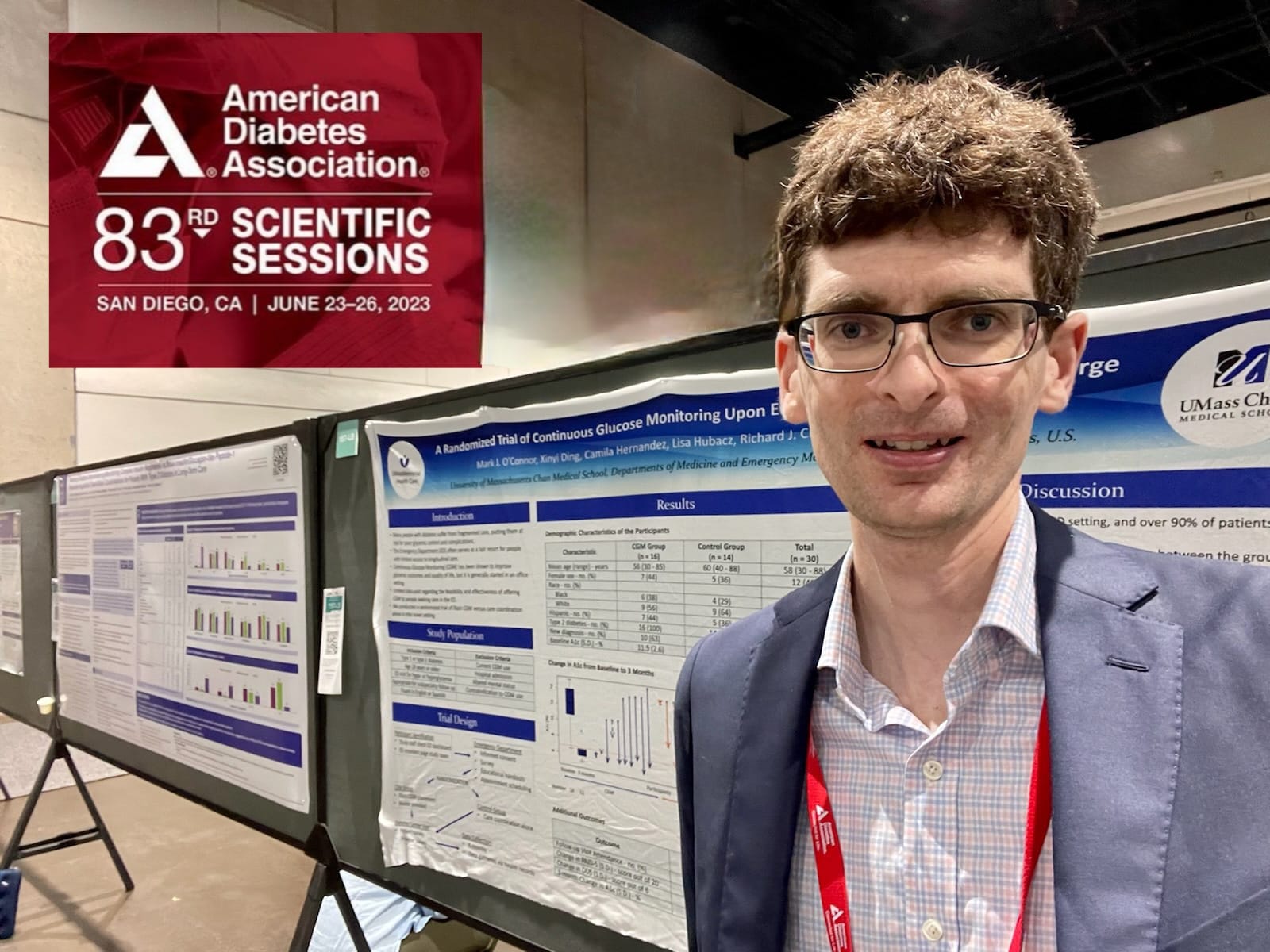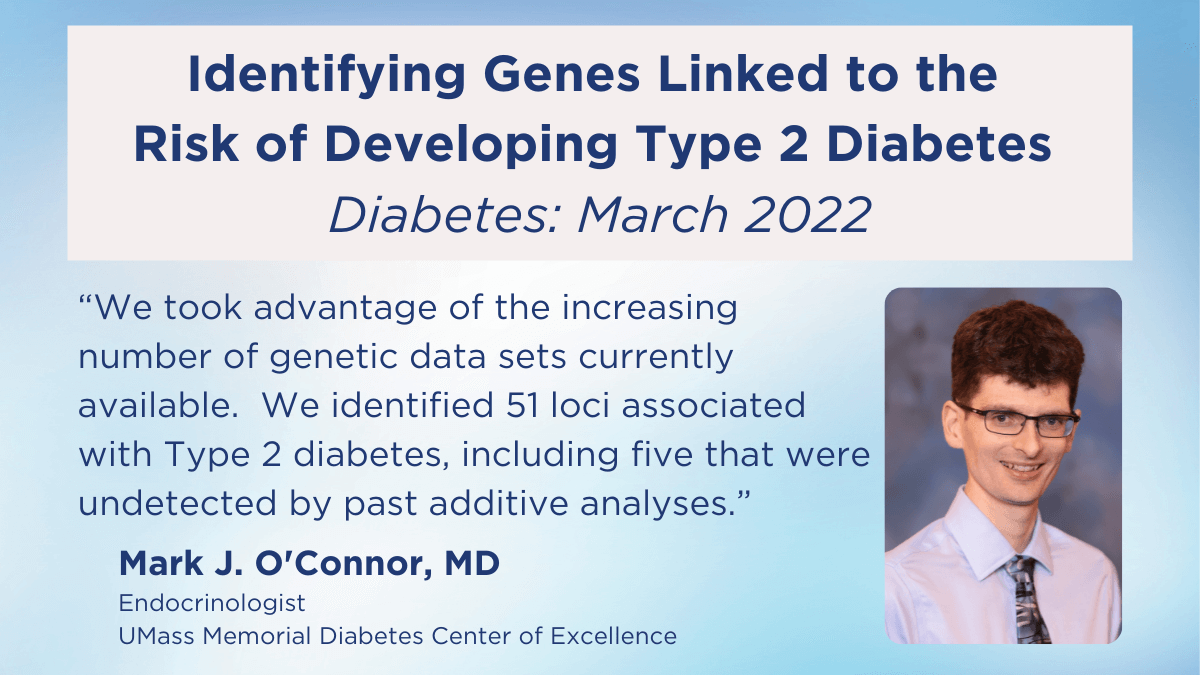Care Team Spotlight: Mark O’Connor, MD – Endocrinologist
Dr. O’Connor joined the UMass Memorial Diabetes Center of Excellence (DCOE) after completing his endocrinology fellowship at Massachusetts General Hospital, but he is no stranger to Worcester. He graduated from UMass Chan Medical School and after completing his internship and residency at Dartmouth-Hitchcock Medical Center, he returned to Worcester to work as a hospitalist at Memorial Hospital before pursuing fellowship training in Boston. During that fellowship, in addition to treating patients with a wide range of endocrine disorders, he studied the genetics of type 2 diabetes at the Broad Institute of MIT and Harvard. A Massachusetts native, Dr. O’Connor currently lives in Central Mass with his wife and toddler.
"In a sense, he returned home," said Dr. Samir Malkani, Clinical Chief of the UMass Memorial Diabetes Center of Excellence. When Dr. O’Connor was a medical student, Dr. Malkani was his first endocrinology supervisor. "I feel very fortunate that he decided to begin his diabetes and endocrinology care and research career here."
What Attracted Dr. O’Connor to Worcester's Diabetes Center of Excellence
“I like the multidisciplinary approach of the DCOE,” he said. He appreciates having specialists like a nephrologist with an interest in diabetic kidney disease on the care team., since diabetes is the most common cause of kidney disease. “I also value our diabetes educators who help with everything from insulin pumps to nutrition and so many other topics affecting people with both type 1 and type 2.”
He highlighted the clinic's workflow and spoke specifically about the value of point-of-care A1c testing. “It optimizes patient care. Our patient care assistants administer the A1c test, and results are ready when the doctor enters the exam room,” he said. “If people use CGM or an insulin pump, that data is downloaded for us ahead of time so we can maximize our time formulating a plan with the patient.”
“Specialty Pharmacy is also a great resource,” added Dr. O’Connor. “Our care team works hard to find the most cost-effective medication for each patient and helps people navigate the challenges of the health insurance system.”
Why Diabetes Care
Dr. O’Connor chose to focus on diabetes care because of the high prevalence of type 2 diabetes (T2D). “I felt like studying diabetes was a way to help a large number of people.” He’s excited to assist people developing individualized care plans incorporating the latest treatment options. He believes in the DCOE's care team approach in which an endocrinologist, nurse practitioner, and diabetes educator work as a team with each patient, utilizing the latest technology and medications to treat type 1 or type 2 diabetes.
Challenges of Treating Diabetes
Dr. O’Connor understands that healthcare costs such as medication prices as well as insurance co-pays and deductibles make it difficult for people with type 1 and type 2 diabetes. Similarly, the costs of obtaining and preparing healthy foods and getting regular exercise can be significant, especially for people working and raising families. And for type 1 diabetes, especially, he recognizes the psychological toll it takes to manage a disease that requires such constant attention. “Our ability to pay attention to multiple things at the same time is limited,” said Dr. O’Connor. “When diabetes is a constant focus it can affect your mental well-being.”
Diabetes Research
Dr. O’Connor is passionate about research because diabetes is a disease that affects so many people yet still involves so many unanswered questions. In large biobank datasets with hundreds of thousands of participants, he is investigating genes that are linked to a person’s T2D risk and is also studying new mechanisms by which people develop the disease. He also plans to conduct more clinical research, including clinical trials.
"Dr. O’Connor will find plenty of opportunities to forge collaborations with the talented faculty at UMass Chan Medical School to pursue a rewarding career combining diabetes care with his research interests," added Dr. Malkani.
The GOOD-ER Study
This randomized clinical trial provided continuous glucose monitors (CGM) to people with diabetes who were currently not using one and arrived at the Emergency Room with high or low blood sugar, or other diabetes related complications. It was the first of its kind to evaluate the benefits of CGM for ER patients.


Type 2 diabetes (T2D) affects nearly 1 out of 12 adults worldwide, but genetic risk factors are still not fully understood. Over the past decade, genome-wide association studies (GWAS) have used additive models to identify hundreds of loci associated with T2D risk. A locus is the specific physical location of a gene or other DNA sequence on a chromosome, like a genetic street address.
Additive models are computationally simple and statistically powerful, but they don’t always match the pattern of inheritance of Mendelian disorders, such as monogenic forms of diabetes, which occur when specific mutations in single genes are inherited from one parent. Certain variants can go undetected using additive models, leaving potentially important genes undiscovered.
Dr. O'Connor led the largest GWAS meta-analysis study ever done using a recessive model for T2D. The results, published in the journal Diabetes, demonstrate that recessive models can identify new genetic risk factors for T2D, including variants with large effect sizes.
The full publication “Recessive Genome-Wide Meta-analysis Illuminates Genetic Architecture of Type 2 Diabetes” can be found here.
Dr. O’Connor’s Favorites
Hobbies/Activities: Hiking, running, and playing the piano.
Massachusetts Locations: Lake Park, Purgathttps://www.umassmed.edu/globalassets/diabetes-center-of-excellence-dcoe/images/news-stories/mark-oconnor-type2diabetes-genes.pngory Chasm, Moore State Park
TV Shows: Scrubs
Music: Traditional, Classical, Jazz, “Almost anything basically.”
Diabetes Center of Excellence Care Team Spotlights
Victoria Andersen - Clinical Nutritionist & Diabetes Educator
Cheryl Barry - Certified Diabetes Care and Education Specialist
Taylor Boudreau - Nurse Practitioner
Ashley Bustos - Diabetes Educator
Fernanda Costa - Certified Diabetes Care and Education Specialist
Clare Foley - Nurse Practitioner
Lindsey Gurry - Nurse Practitioner
Christine Hoogasian - Nurse Practitioner
Susan Kim - Nurse Practitioner
Nancy Morris - Nurse Practitioner
Mark O'Connor - Endocrinologist
Prateek Shukla - Endocrinologist
Nancy Sidhom - Nurse Practitioner & Certified Diabetes Care and Education Specialist

